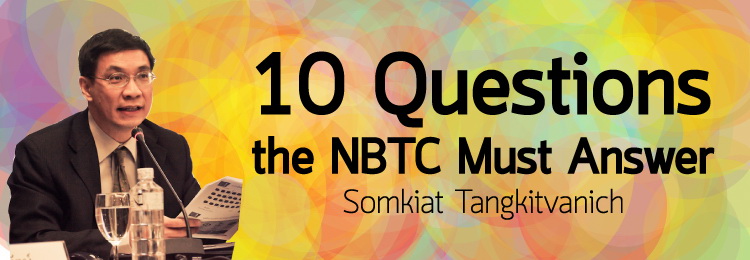Somkiat Tangkitvanich, PhD
Thailand Development Research Institute
Recently, the worlds of research, media and telecommunications have been in disbelief in several actions taken by Thailand’s National Broadcasting Telecommunications Commission (NBTC).
First, The Telecommunications Committee of the NBTC (hereafter the “Committee”) has agreed to extend the use of 1800 MHz frequency spectrum for True Move and DPC for another year, in effect extending the concessions of the two operators, without subjecting them to a competitive auction.
Second, the Committee has also filed defamation cases against Dr. Duenden Nikomborirak, TDRI’s Research Director, and Dr. Nattha Komolvadhin, ThaiPBS’s anchor, who have criticized and reported such action of the Committee, respectively.
Although filing a defamation case is a legal right for the Committee to do so, the action has raised questions, concerns and calls for the NBTC to be more accountable and answerable to the public at large.
During a press conference held earlier this month, I have put forth ten questions which the Committee must answer to the public, before they decided to sue the researcher and the media over the issue.
Subsequently, the NBTC’s website has published a long-winded and repeated explanation which they have given before.
These explanations did not straightforwardly answer my ten questions – but there was one comment which said “the ten questions which were raised are old issues which present only one-sided information” and “if the Committee answers those ten questions, the public will be even more confused”. The NBTC has also accused me of “trying to distract from the real issue”.
I was taken by surprise by the latest gesture from the NBTC office because it signals that even posing questions to the NBTC is no longer acceptable and should not be done under any circumstances.
This has gone at odd with the duties of such public organization and the people who meant to serve the people of Thailand but do not welcome any criticisms or questions.
The dispute over the 1800 MHz spectrum concessions is an important public issue, and we cannot deny the fact that there are many, not just myself and TDRI’s researchers, who questioned the legality and appropriateness of such decision of the Committee. Numerous legal experts, academics, members of the media and various civil society groups have expressed through social media that they too disagree with the decision.
In my opinion, the Committee and the NBTC office, as a public servant and public organization, funded by the public money and remunerated by the telecom consumers’ money, should not distract from the issue at hand and continue to blame others for their lack of ineffective management.
Once again, I am reposting my ten questions which the Committee must answer to the public, clearly and honestly, before they decided to sue anyone with a different opinion:
- Since taking the office in October 2011, are you not aware that the concession contracts for True Move and DPC will be expired in September 2013?
- Have you forgotten that the Master Plan for NBTC’s frequency allocation, that you took part in drafting in April 2012, states that the frequency must be returned when the concession contract expires?
- Are you not aware that the NBTC Act prohibits the renewal of concession contract and only allows frequency allocation through a competitive auction process?
- Are you not aware that the legal advisory sub-committee of NBTC has given opinion about similar case (the case of 800 MHz) that concession contracts cannot be extended or renewed and that a large number of legal academics have given similar opinion?
- Have you ever sought legal opinions from external parties such as the Council of the State or even the NBTC’s legal advisory sub-committee before extending the concession contracts? Or did you use your own judgment before taking such action?
- Have you ever informed users of True Move and DPC well in advance (e.g. soon after the announcement of the Master Plan) that the concession contracts will be expiring?
- Did you prevent True Move and DPC well in advance from offering their services beyond the expiry date of the concession contracts, which would ultimately cause complicated outcomes?
- Did you prepare the existing users for mass number portability so that they will not be trapped in the expiring concession contracts well in advance?
- Have you ever engaged a consultant to evaluate the price of the frequency spectrum and design the auction process for the 1800 MHz spectrum, before claiming that there was not enough time to conduct an auction?
- For more than 420 days, since the announcement of the Master Plan to the day the Committee agreed to extend the concession contracts, do you think that you have ‘insufficient’ time to work effectively and efficiently to address this matter?
I sincerely hope that the Committee will address the above questions as directly and honestly as possible.
Once again, it would be worth stressing here that as a public organization, the NBTC should not hesitate to answer any questions from anybody in the Thai society. It is the first sign that an organization is ready to be accountable and answerable for one and all.

